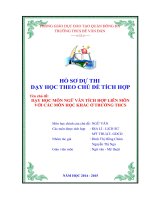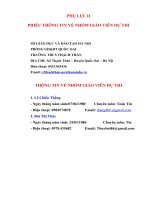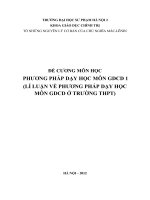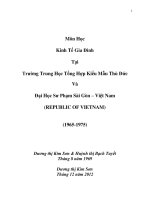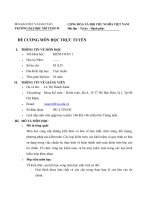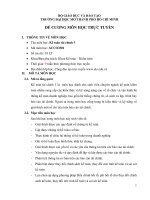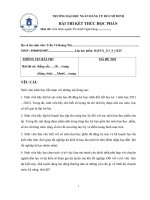Môn học về thiết kế đề thi _ Ngôn ngữ Anh
Bạn đang xem bản rút gọn của tài liệu. Xem và tải ngay bản đầy đủ của tài liệu tại đây (1.31 MB, 21 trang )
<span class="text_page_counter">Trang 2</span><div class="page_container" data-page="2">
Testing has played an important role in the education sector in general, and the language education field specifically. This is one of all approaches measuring directly the current language level of learners. The main purpose is not only to determine the language knowledge the learners acquire but also to find out the lack of elements that have to improve. Because of that, we design a test for students in the Pre-intermediate level with knowledge in the coursebook - Cutting Edge. Module 4 to 6 is the particular content focusing on two main points: vocabulary and grammar, and other fields: pronunciation, writing, and reading skills.
The test consists of 40 multiple choice questions divided into five sections. The pronunciation is the recognition of consonants and stress syllables. The vocabulary is related to the topic of special days, time off, and appearances. The grammar is associated with the present continuous, the present simple, comparative and superlative adjective, and so on. Reading skill is applying "scanning" and "skimming" techniques. Writing skill is using grammar to rewrite. To increase the difficulty level of the test, we add the
synonym and antonym of words to the same topic.
We base on criteria: validity, discrimination, reliability, practicality, and authenticity to create the test. We hope that the language knowledge students acquired and their effort help them complete well.
</div><span class="text_page_counter">Trang 3</span><div class="page_container" data-page="3"><b>I. IDEAS INTENDED FOR ASSESSMENT: </b>
First syllable stressed:
Second syllable stressed:
</div><span class="text_page_counter">Trang 4</span><div class="page_container" data-page="4">Have a good day
The day after
</div><span class="text_page_counter">Trang 5</span><div class="page_container" data-page="5"><b>3.1 Comparative and superlative adjectives: </b>
<i>a. Comparative: Using to compare two people, places, things or action </i>
- Compare adjectives
- Compare adverbs (for actions)
<b>+ regular: quickly more quickly </b>
slowly more slowly
<b>+ irregular: hard harder </b>
well better badly worse
<i>b. Superlative: Using to say which is the biggest in a group </i>
<i><b>Note: After superlatives, we use in + name of places or singular words for groups </b></i>
of people.
Subject + Verb + comparative adjective/adverb + than + Object
Subject + Verb + the + superlative adjective + Object
</div><span class="text_page_counter">Trang 6</span><div class="page_container" data-page="6"><i><b>c. Forming regular comparatives and superlatives: </b></i>
short <b>one syllable: add –er (shorter) one syllable: the + adj (add –est) (the shortest) </b>
big one vowel + one consonant:
<b>double final consonant (bigger) </b>
one vowel + one consonant: double final
<b>consonant (the biggest) </b>
busy <b>consonant + y: y+ -ier (busier) consonant + y: the + adj (y+ -iest) (the busiest) </b>
relaxed 2 or more syllables: more + adj
<b>(more relaxed) </b>
2 or more syllables: the most + adj
<b>(the most relaxed) </b>
<i><b>d. Forming irregular comparatives and superlatives: </b></i>
far further/farther the furthest/farthest
</div><span class="text_page_counter">Trang 7</span><div class="page_container" data-page="7"><b>3.2 Present simple: </b>
<i>a. Formula: </i>
<b>Positive form Negative form Question form </b>
<b>I/you/we/they read I/you/we/they don’t (=do </b>
<b>not) read <sup>Do I/you/we/they read? </sup>he/she/it reads he/she/it doesn’t (=does </b>
<b>not) read <sup>Does he/she read? </sup></b>
<b> Usage: </b>
- Use the Present simple for habits or things that you do every day/week/ year, or for things that are generally true or always happen.
<i>- We usually use the Present simple with phrase like always, usually, often, sometimes, never, … </i>
<i>b. The spelling for the 3<sup>rd</sup> person</i>: (he, she, it)
<i><b>ends in a consonant + -y change -y to -ies </b></i> <b>She studies English. </b>
ends in
<b>-s, -x, -ch, -sh </b>
<b>She fixes her bike. Mike catches the bus. She finishes her homework. </b>
<i><b>Jack does all the shopping. </b></i>
all other verbs <i><b>add -s My sister knows him very well </b></i>
<b>3.3 Present continuous: </b>
<i>a. Formula: </i>
<b>I’m (= am) reading I’m not (=am not) reading Am I working? you/we/they’re (= are) </b>
<b>reading </b>
<b>you/we/they aren’t (= are </b>
not) reading
<b>Are you/they/we reading? he/it/she’s (= is) reading he/she/it isn’t (= is not) </b>
<b>reading </b>
<b>Is she/he/it reading? </b>
</div><span class="text_page_counter">Trang 8</span><div class="page_container" data-page="8"><b> Usage: </b>
- We use the Present Continuous for things that are happening at the moment or things happening in present period but not at this moment.
<i>- We usually use the Present Continuous with phrase like now, at the moment, at the present, at this time, … </i>
<i>b. Some notes: </i>
<b>- For -ing forms with most verb, some exceptions </b>
has one syllable and ends in vowel + one consonant
double the final consonant
stop stropping
has two syllables end in vowel + one consonant, stress on the last syllable
double the final consonant
begin beginning
<i><b>has two syllables and ends in -l double -l </b></i> travel travelling
<b>- We are not use the Present Continuous in some verbs: </b>
+ Describing mental states: believe, know, understand, think, remember + Verbs connected with like/dislike: like, love, want
+ Verbs connected possession: have, own, belong, possess
<b>3.4 Simple future tense: (will) </b>
- Make decisions at the same time. Ex: I think they will come.
- Say promises, offers, requests and threats.
</div><span class="text_page_counter">Trang 9</span><div class="page_container" data-page="9">- There is a difference between “be going to” and “will”. Using “be going to” is what we intend, while “will” is what we expect.
Ex: <b> I’m going to send this airplane ticket to her today. He’ll come here on time. </b>
- There are no will forms of can and must. We can use “will able to” and “will have to”.
<b>3.5 Intensions and wishes: (going to, planning to, would like to, would rather) </b>
<i>a. Structure “going to” and “planning to”: </i>
<b>She/He/It’s going to/ planning to buy a car </b>
<b>She/It/He’s not going to /planning to buy a car. </b>
<b>Is he/she going to/ planning to buy a car? You/They/We’re going to/ </b>
<b>planning to buy a car </b>
<b>You/They/We’re not going to/ planning to buy a car </b>
<b>Are you/we/they going to/planning to buy a car? </b>
<b> Usage: </b>
- We use “going to” to talk about what we intend to do in the near future or the more distant future.
Ex: I’m going to organize a party.
- We use “planning to” when we have thought carefully about the plan and decided how to do it.
Ex: I’m planning to study abroad next year.
</div><span class="text_page_counter">Trang 10</span><div class="page_container" data-page="10"><i>b. Structure “would like to” and “would rather”: </i>
S + would like to + V S + would rather + V
S+ would not like to + V S+ would rather + not + V
Would + S + like to/rather + V <b>like to/ rather listen to music? </b>
<b> Contraction: I would = I’d </b>
I would not = I wouldn’t
<b> Usage: </b>
- We use “would like” to say what you want to do Ex: She’d like to stay at home.
- We use “would rather” to say we prefer one thing to another thing, use Infinitive without to
Ex: He’d rather not go shopping.
<b>3.6 Comparison between future simple and near future (be going to) </b>
FUTURE SIMPLE <sub>BE GOING TO </sub>
Express a decision at the moment of speaking. (Ex: You missed your mother’s phone./ Ok, I will call her back.)
Express a planned decision (Ex: I’m going to watch movie with my friend tomorrow.
Express unfounded prediction. (Ex: Who do
you think will win this game?) <sup>Express prediction based on present </sup><sub>evidence. (Ex: The sky is very black. It is </sub> going to rain.)
Offers/ Promises/ Request/ Refusals
</div><span class="text_page_counter">Trang 13</span><div class="page_container" data-page="13"><b>II. MULTIPLE CHOICE TEST: </b>
<b>1. Pronunciation: </b>
<b>Choose the word which is stressed differently from the rest. (0,5pt) </b>
<i><b>Question 1: (Section 1.1) Remember (Recognizing word stress) </b></i>
A. fashionable B. sophisticated C. gorgeous D. elegant
<b>Answer: B. sophisticated (Second syllable stressed - B; First syllable stressed - A, C, D) </b>
<i><b>Question 2: (Section 1.1) Remember (Recognizing word stress) </b></i>
A. athletic B. ceremony C. present D. calendar
<b>Answer: A. athletic (Second syllable stressed - A; First syllable stressed - B, C, D) Choose the word which has the underlined part pronounced differently from the rest. (0,75pt) </b>
<i><b>Question 3: (Section 1.2) Remember (Recognizing /ð/ and /θ/) </b></i>
<b>Answer: C. faith (</b>/θ/)
<i><b>Question 4: (Section 1.2) Remember (Recognizing /n/ and /ŋ/) </b></i>
<b>Answer: B. tongue (/ŋ/) </b>
<i><b>Question 5: (Section 1.2) Remember (Recognizing /ð/ and /θ/) </b></i>
<b>A. seventh B. weather C. father D. these </b>
<b>Answer: A. seventh (/θ/)</b>
</div><span class="text_page_counter">Trang 14</span><div class="page_container" data-page="14"><b>2. Vocabulary: </b>
<b>Choose the word or phrase A, B, C, or D that best completes the sentences or substitutes for the underlined word or phrase. (2,5pt) </b>
<b>Question 6: We might be able to __________ your request for transfer. </b>
A. accommodate C. accommodation B. accommodated D. accommodating
<i><b>Answer: (Section 2.2) A. accommodate (Understanding the meaning of word and family </b></i>
word)
<b>Question 7: My boyfriend is very _______. </b>
A. look good C. good-looking B. looking good D. good looking
<i><b>Answer: (Section 2.2) C. good-looking (Understanding the meaning of word and family </b></i>
word)
<b>Question 8: The host’s party usually ______ the candles on the birthday cake before </b>
eating it.
B. blows over D. blows off
<i><b>Answer: (Section 2.1) C. blows out (Remembering/Understanding phrasal verb “blow”) </b></i>
<b>Question 9: In order to ______ my family, I must ______ a good job. </b>
A. look up/ have a look C. look after/ look for B. look for/look at D. look around/ look for
<i><b>Answer: (Section 2.1) C. look after/ look for (Remembering/Understanding wordspot </b></i>
“look”)
<b>Question 10: Choose A, B, C, or D that best substitutes the underlined part. </b>
The Earth is being destroyed because humans use poisonous chemicals. A. harmless C. contaminated
B. meaningless D. innocent
<i><b>Answer: (Section 2.1) C. contaminated (Understanding meaning) </b></i>
</div><span class="text_page_counter">Trang 15</span><div class="page_container" data-page="15"><b>Question 11: She has ______ . </b>
A. black curly long hair C. long curly black hair B. curly black long hair D. curly long black hair
<i><b>Answer: (Section 2.2) C. long curly black hair (Understanding adjective order) </b></i>
<b>Question 12: My wife is tired of cooking so we decide to ______ . </b>
A. eat up C. eat out B. eat away D. eat into
<i><b>Answer: (Section 2.1) C. eat out (Remembering/Understanding phrasal verb “eat”) </b></i>
<b>Question 13: Ngoc should have _____methods to increase her standard of living. </b>
A. specific C. blurred B. vague D. inexplicit
<i><b>Answer: (Section 2.1) A. specific (Remembering the meaning of words and knowing </b></i>
synonym and antonym)
<b>Question 14: Lisa is going to organize a special _______ to mark her parents' golden </b>
</div><span class="text_page_counter">Trang 16</span><div class="page_container" data-page="16"><b>3. Grammar: </b>
<b>Choose A, B, C, or D that best completes each unfinished sentence; or that best substitutes the underlined part. (2,75pt) </b>
<b>Question 16: The forecast weather for today announces that it ______ . </b>
B. is going to rain D. rain
<i><b>Answer: (Section 3.7) B. is going to rain (Understanding structure “be going to +V”and </b></i>
future simple)
<b>Question 17: The winter ______ season in the year. </b>
A. is being the colder C. is the coldest B. is the most cold D. is colder
<i><b>Answer: (Section 3.5.b) C. is the coldest (Remembering superlative adjective) </b></i>
<b>Question 18: Mr. John _______ his children do their homework every day. </b>
<b>Answer: </b><i>(Section 3.2) B. teaches (Remembering present tense) </i>
<b>Question 19: Hey, Lan! Do you know that girl, who ______ with Ms. Ngoc there? </b>
A. talk C. will talk
A. reads/ is reading C. is reading/ is reading B. reads/ reads D. is reading/ reads
<i><b>Answer: (Section 3.7) A. reads/ is reading (Understanding using Present Tense and </b></i>
Present Continuous)
</div><span class="text_page_counter">Trang 17</span><div class="page_container" data-page="17"><b>Question 21: He _______me about my flight status when I _____ to his ticket agency </b>
tomorrow.
A. will inform/ come C. informs/ come
B. inform/ come D. will inform/ will come
<i><b>Answer: (Section 3.7) A. will inform/ come (Understanding using simple future and </b></i>
simple present)
<b>Question 22:</b> That film is ________ than the previous one I watched. A. more interested C. more interesting
B. more interestingly D. most interesting
<i><b>Answer: (Section 3.4.b) C. more interesting (Remembering comparative) </b></i>
<b>Question 23: I am ________ my homework at 7pm on Saturday. </b>
A. going to submit C. going to submitted B. submitting D. submitted
<i><b>Answer: (Section 3.3) C. going to submitted (Understanding “be going to +V”) </b></i>
<b>Question 24: My parents got married in 2002. Surely they ______ their 20th wedding anniversary next year. </b>
A. will celebrate C. are going to celebrate B. are celebrating D. B & C
<i><b>Answer: (Section 3.7) D. B & C (Understanding present continuous and “be going to”) </b></i>
<b>Question 25: Lisa______ while her brothers ______ . </b>
A. is learning/is watching movie C. is learning/are watching movie B. learns/are watching moving D. learns/watch
</div><span class="text_page_counter">Trang 18</span><div class="page_container" data-page="18"><i><b>Answer: (Section 3.1) C. is learning/are watching movies (Understanding present </b></i>
continuous)
<b>Question 26: Of the five pens, which is ______ expensive? </b>
A. the most C. the best B. the more D. the better
<i><b>Answer: (Section 3.5.a) A. the most (Understanding superlative adjective) </b></i>
<b>4. Reading: </b>
<b>Read the passage carefully, then choose the one best answer, A, B, C, or D. (2,5pt) Passage 1: </b>
Many people spend their summer holidays in the one of the many cities in Italy. Each city has something else different thing to offer. During the 15th century, Venice became one of the richest states in Europe. It continues to grow up today. Some say that Venice never
<b>changes. It looks just as if beautiful the first, second or third time you visit. There are </b>
more than 150 canals are crossed by 400 bridges. So, as much of the city can be seen on foot. Others prefer to the small town of Lecce in the South of the country. Famed for its olive oil and fish restaurants, Lecce attracts lots of Italian visitors. It is busy in August when people gather for the flower festival. Its fine churches are usually decorated the all year round. The mountain country to the North of Milan provides for skiing in the winter and walking in the summer. It appears that Italy has something for everyone: each one
<b>region offers something different. </b>
<b> Question 27: Which of the following statements is not true? </b>
A. There are many canals that are crossed by 400 bridges.
B. Many Italian visitors visit Lecce because of the renowned olive and fish restaurants.
C. There is no change in the beauty of Venice.
D. The mountain country to the North of Milan is a place for skiing in the summer.
<b>Answer: D. The mountain country to the North of Milan is a place for skiing in the summer. </b>
</div><span class="text_page_counter">Trang 19</span><div class="page_container" data-page="19"><b>Question 28: Venice ______ . </b>
A. is the most beautiful states in Italy B. is the most prosperous states in Europe C. is the wealthiest in the world
D. is the richest natural resources in Europe
<b>Answer: B. is the most prosperous states in Europe Question 29: The word “It” in line 4 refers to ______ . </b>
A. Italy C. Lecce B. Venice D. Milan
<b>Answer: A. Italy </b>
<b>Question 30: Which specific thing is in August in Lecce? </b>
A. fish restaurants B. beautiful weather B. flower festival D. famous churches
<b>Answer: B. flower festival </b>
<b>Question 31: Which of the following words is NOT a synonym with “canal”? </b>
A. waterway C. drain B. brook D. trench
<b>Answer: B. brook Passage 2: </b>
Going to party can be fun and enjoyable. If you are invited to a party, do call your host up early to inform him/her of whether you are going. If you want to bring someone who has not been invited along with you, you should ask for permission first. Remember to dress
<b>appropriately for the party. You will stick out like a sore thumb if you are dressed </b>
formally whereas everyone else is in T-shirt and jeans. If you are not sure what to wear, do ask your host.
During the party you may perhaps like to help your host by offering to serve drinks or wash the dishes. Your host would certainly appreciate these efforts. If you happen to be in a party you do not know anyone, do not try to monopolize the host's attention. This is inconsiderate since your host has many people to attend to and cannot spend all his/her
</div>
